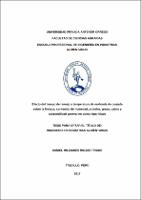Efecto del tiempo de remojo y temperatura de mollenda de cuajada sobre la firmeza, contenido de humedad, proteína, grasa, calcio y aceptabilidad general en queso tipo hilado

View/
Download
(application/pdf: 1.195Mb)
(application/pdf: 1.195Mb)
Date
2017Author(s)
Riojas Tirado, Daniel Milciades
Metadata
Show full item recordAbstract
Se evaluó el efecto del tiempo de remojo (48, 72 y 96 h) y temperatura de
molienda de cuajada (55 y 65 °C) sobre el contenido de humedad,
proteína, grasa, calcio, firmeza y aceptabilidad general en queso Hilado,
con una temperatura controlada de remojo de 20 ±1 °C y proporción
agua/cuajada (3/1). El análisis de varianza indicó que el tiempo de remojo
presentó efecto significativo sobre el contenido de calcio y firmeza; y la
temperatura de molienda sobre el contenido de grasa. La prueba de
Duncan determinó que el tratamiento con 72 h de remojo y 65 °C de
molienda permitió obtener mejor valor de contenido de grasa (20.38%),
calcio (209.72 mg/100 g) y firmeza (3.41 N). Para aceptabilidad general
las pruebas de Friedman y Wilcoxon determinaron diferencias
significativas entre las muestras evaluadas, además, el tratamiento con 72
h y 65 °C presentó mayor rango promedio de 5.10 y moda de 8
correspondiente a la percepción de “Me gustó mucho” en queso tipo
Hilado. The effect of the soaking time (48, 72 and 96 h) and curd milling
temperature (55 and 65 °C) on the content of moisture, protein, fat,
calcium, firmness and general acceptability in yarn cheese was evaluated,
with a controlled soaking temperature of 20 ± 1 ° C and water/curd ratio
(3/1).The analysis of variance indicated that the soaking time had a
significant effect on the calcium content and firmness; and the grinding
temperature on the fat content. The Duncan test determined that the
treatment with 72 h of soaking and 65 °C of grinding allowed obtaining a
better value of fat content (20.38%), calcium (209.72 mg/100 g) and
firmness (3.41 N). For general acceptability the Friedman and Wilcoxon
tests determined significant differences between the evaluated samples, in
addition, the treatment with 72 h and 65 °C presented a higher average
range of 5.10 and a moda of 8 corresponding to the perception of ““I liked it
a lot““ in type yarn cheese.
Collections
- Industrias Alimentarias [152]

